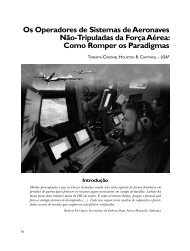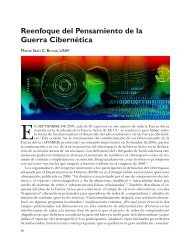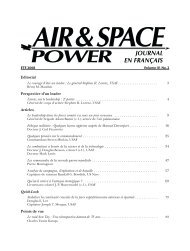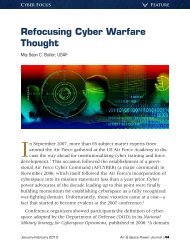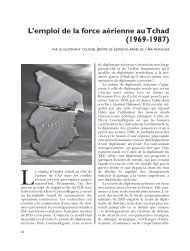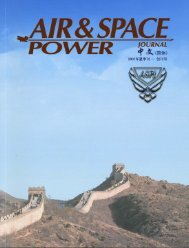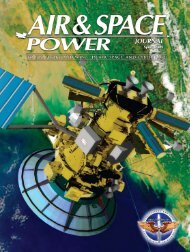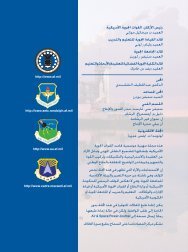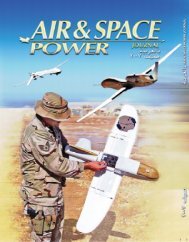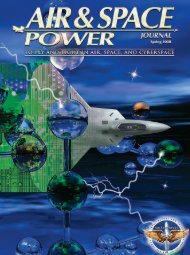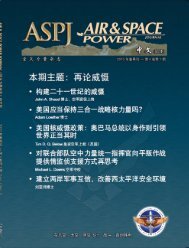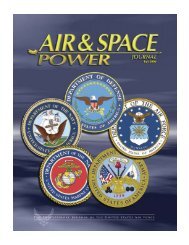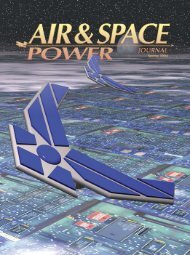Carta ao AFRICOM No. 1 - Air & Space Power Chronicle
Carta ao AFRICOM No. 1 - Air & Space Power Chronicle
Carta ao AFRICOM No. 1 - Air & Space Power Chronicle
You also want an ePaper? Increase the reach of your titles
YUMPU automatically turns print PDFs into web optimized ePapers that Google loves.
A IRAQUIZAÇÃO DA ÁFRICA 852007, http:// media.washingtonpost.com/wp-rv/nation/documents/McCaffrey_Report_032707.pdf.28. Chietigj Bajpaee, “Sino-US Energy Competition inAfrica,” <strong>Power</strong> and Interest News Report,7 octubro 2005,http://www.pinr.com/report.php?ac=view_report&report_id=378&language_id=1.29. Tisdall, “US Moves in Africa.”30. Carafano and Gardiner, “US Military Assistancefor Africa.”31. Lobe, “Africa to Get Its Own US Military Command.”32. Ver a explanação de John Garnett, “Defence Policy-Making,” em John Baylis et al., Contemporary Strategy II(New York: Holmes & Meier, 1987), 2.33. Vários delegados norte-americanos mencionaramtal ponto em particular, durante o 33 rd InternationalCongress of Military History em Cape Town, 13–17 agosto2007, onde foi feita a leitura de esboço preliminar.34. Clough, Free At Last? 2.35. Peter J. Schraeder, United States Foreign Policytoward Africa: Incrementalism, Crisis, and Change (Cambridge:Cambridge University Press, 1994), 2.36. Ver a explanação deste fenômeno em Dan Henk,“The Environment, the US Military, and Southern Africa,”Parameters 36, no. 2 (Verão 2006): 98–117.37. Dr. Dan Henk, <strong>Air</strong> War College, mensagem eletrônica<strong>ao</strong> autor, 30 julho 2007.38. Bender, “Pentagon Plans New Command.”39. Testemunho de Mark Malan, “<strong>AFRICOM</strong>: A Wolfin Sheep’s Clothing?” ante o Subcomitê de AssuntosAfricanos, Comitê de Relações Exteriores, Audiência doSenado, intitulada Exploring the U.S. Africa Commandand the New Strategic Relationship with Africa, 110thCong., 1st sess., 1 agosto 2007, http://foreign.senate.gov/testimony/2007/MalanTestimony070801.pdf.40. Uma apreensão expressa pelo Cel Johan van derWalt (Oficial Líder do Estado Maior, Operações de Apoio dePaz [Peace Support Operations-ONU] da Força de DefesaNacional da África do Sul [South African National DefenseForce]), entrevista telefônica com o autor, 28 agosto 2007.41. Herbert M. Howe, Ambiguous Order: MilitaryForces in African States (London: Lynne Rienner Pub.,2001), chap. 2.42. Mluleki George, Ministro de Defesa Assistente daÁfrica do Sul (palestra, abertura oficial do 33rd InternationalCongress of the International Commission for MilitaryHistory, Cape Town, África do Sul, 13 agosto 2007).43. Lloyd, entrevista.44. Infelizmente, os militares americanos não compreendema importância de utilizar estruturas regionais econtinentais. Ver “Africa: U.S. Military Command to SeekValue-Added Capabilities for Africa,” The News, 4 outubro2007, http://allafrica.com/stories/200710040767.html.45. Ibid.46. Liesl Louw, “Verenigde State van Afrika: AU BeginPraat,” Beeld, 2 julho 2007, 10.47. Para excelente exposição da tensão existente napolítica exterior sul-africana entre a democracia e o africanismoe anti-colonialismo, ver Laurie Nathan, “Consistencyand Inconsistencies in South African Foreign Policy,” InternationalAffairs 81, no. 2 (Março 2005): 361–72.48. L. Scholtz, “Sal Afrika se Gras Weer TrapplekWord?” Die Burger, 9 fevereiro 2007, 8.49. Ver a explanação deste fenômeno em Thomas E.Ricks, Fiasco: The American Military Adventure in Iraq(London: Penguin Books, 2006), 129–33.50. CAPT Larry Seaquist, US Navy, Reformado, “CommunityWar,” Proceedings, United States Naval Institute,agosto 2000, 56–59, http://www.d-n-i.net/fcs/seaquist_community_war.htm.51. Colin S. Gray, War, Peace and International Relations:An Introduction to Strategic History (London:Routledge, 2007), 223.52. Robert D. Kaplan, TheComingAnarchy:ShatteringtheDreamsof thePost ColdWar (New York: RandomHouse, 2000).53. Robert D. Kaplan, “The Coming Anarchy: HowScarcity, Crime, Overpopulation, Tribalism, and DiseaseAre Rapidly Destroying the Social Fabric of Our Planet,”The Atlantic Monthly 273, no. 2 (fevereiro 1994): 44–76,http://www.theatlantic.com/doc/prem/199402/anarchy.54. O Ministro de Defesa Sul-Africano declarou explicitamenteque um maior número de soldados americanosnão será bem vindo. Ver Hartley, “Southern Africa.” Abase para esse sentimento anti-americano pelo governosul-africano não é bem clara. Talvez seja uma conexãoideologica com o partido sul-africano que se encontraagora no poder, o ANC, enraigado, firmemente no “outrolado da colina” durante a Guerra Fria. Talvez até possuidimensão histórica com o apoio norte-americano àsminorias euro-africanas, agarradas <strong>ao</strong> regime minoritárioem muitos países africanos durante a Guerra Fria. As diretrizesatuais também podem influenciar a estratégianorte-americana de expropriação e outras metodologiasmais agressivas e militarizadas em sua política exterior,vistas como neo-imperalistas na África. De uma perspectivaeconômica, é possível alegar que a África do Sul possivelmentevê a influência norte-americana cada vezmaior como competição injusta. Sob perspectiva políticainternacional, a África do Sul conta com certos “amigos”



